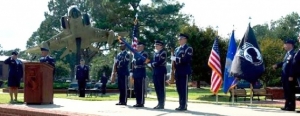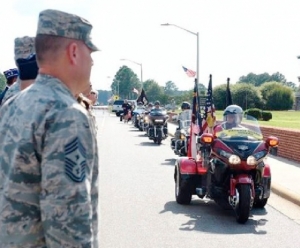SJAFB honors all prisoners of war, those still missing in action
By Rochelle Moore
Published in News on September 17, 2017 1:45 AM

Submitted photo
The base honor guard presents the colors at the start of the POW/MIA ceremony Thursday at Seymour Johnson Air Force Base. More than 83,000 Americans remain missing from World War II, the Korean War, the Vietnam War, the Cold War, the Gulf wars and other conflicts.

Submitted photo
Members of the Patriot Guard Riders ride in formation to escort runners holding the Prisoner of War/Missing in Action flag for the opening ceremony Thursday at Seymour Johnson Air Force Base. The Patriot Guard Riders is an organization whose members attend the funerals of members of the United States military, firefighters and police at the invitation of the deceased's family.
Retired Air Force Capt. Kevin Hynes remembers the day his parents received a telegram that his brother, John, was being held as a prisoner of war during World War II.
John, shot down while navigating a B-17 bomber, was a prisoner of war at the Stalag Luft III POW camp, in Poland, for a year before his release.
After returning home, he only talked about wartime on one occasion, Hynes told Seymour Johnson Air Force Base 4th Fighter Wing leaders and airmen Thursday.
"Today is of special significance to my family," said Hynes, during the base's National POW/MIA Recognition Day ceremony.
"My brother was a POW, along with 9,000 U.S. and British airmen," Hynes said. "When he returned to the states in the summer of '45, he spoke once about his wartime experiences."
John went on to serve again in the Vietnam War. Hynes also served in the Vietnam War where he received a Purple Heart.
The treatment of POWs during the Vietnam War was brutal, and, in some cases, involved several years of solitary confinement for soldiers.
Hynes said the goal was to break the will of POWs to get written and reported propaganda statements that criticized the war.
When the war was over, there were 2,550 Americans still being held as prisoners or classified as missing in action.
In 1979, Congress passed a resolution authorizing POW/MIA Recognition Day. By the mid-1990s, activists convinced Congress to begin full searches in Southeast Asia for prisoners of war and those missing in action, Hynes said.
Today, the Defense Department has the Defense POW/MIA Accounting Agency, which includes 140 people actively conducting searches in Southeast Asia and the Pacific area looking for MIAs from Vietnam, Korea and WWII.
"Through the efforts, the unaccounted number has been reduced to 1,650 today," Hynes said. "We have about 3,900 unaccounted for from the Korean War."
The number of WWII missing has since reduced to 73,000, he said.
The National POW/MIA Recognition Day -- observed today across America -- was observed a day early at Seymour Johnson AFB due to the base's 75th anniversary celebration and events this week.
Col. Brian Armstrong, 4th Fighter Wing vice commander, told fellow service men and women that POWs and MIAs represent a firm commitment all service members accept in their fight for American freedom.
"I believe I speak for all service members when I say I am inspired by the integrity, the fierce loyalty, resolve and the courage displayed by American prisoners of war," Armstrong said. "Let us be reminded of the sacrifice it takes to become the world's most powerful military and the price that is paid to be free."
Since the start of WWII, there have been 130,000 American prisoners of war, with 124 being from the 4th Fighter Wing, Armstrong said.
"In total, more than 82,000 Americans are still missing," Armstrong said. "Our nation will never forget the Americans and will never stop looking for them."
As Armstrong was speaking, four F-15E Strike Eagles flew over the 4th Fighter Wing Headquarters building and grounds where the ceremony took place.
The fighter pilots performed a missing-man formation, with one Strike Eagle breaking off from the group. The missing man formation is an aerial salute performed in memory of a fallen pilot.
Armstrong said the formation was fitting, as POWs and MIAs have played a significant role in the military's mission.
"Our nation's freedom exists because of their courage," he said.
